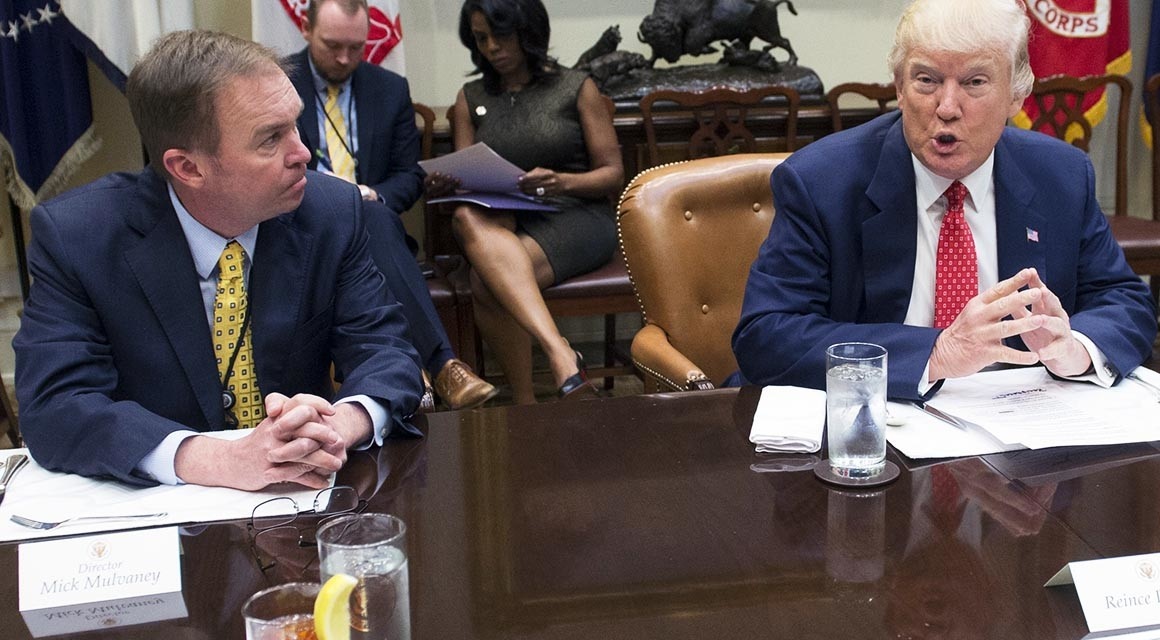Chief of Staff Mick Mulvaney with Donald Trump (Saul Loeb/AFP/Getty)
Trying to cover Donald Trump’s freeze of military aid to Ukraine, Acting White House Chief of Staff Mick Mulvaney waged an intense campaign to provide a legal rationale.
Trump’s ordered the suspension of $391 million in security assistance in late July, days before he met Ukrainian President Zelenskiy. The command was allegedly part of Trump’s “quid pro quo” demanding Kiev’s investigation to tarnish Presidential candidate Joe Biden and to cover up Russia’s interference in the 2016 US election.
A confidential White House review found hundreds of documents testifying to the efforts of Mulvaney for an after-the-fact justification of the freeze, according to “three people familiar with the records“.
Mulvaney, who was also head of the Office of Management and Budget, collaborated with White House budget officials over an explanation which would not point to the quid pro quo.
The OMB implemented the aid freeze, telling concerned US diplomats and national security staff of Trump’s decision without giving a reason.
“One person briefed on the records examination” said White House lawyers are worried about the documents turned up by the review.
In a press conference last month Mulvaney, trying to defend Trump at the start of an impeachment inquiry, fumbled and admitted that Trump was seeking the investigations to portray Ukraine — rather than Russia — intervened in the 2016 Presidential election.
See TrumpWatch, Day 1,004: Trump-Ukraine — Mulvaney Struggles to Explain “Quid Pro Quo” Admission
House committees pursuing the impeachment inquiry sought Mulvaney’s testimony. While appearing to weaken at one point, he finally adhered to a White House order not to appear.
OMB spokeswoman Rachel Semmel insisted on Sunday, “There was a legal consensus at every step of the way that the money could be withheld to conduct the policy review.OMB works closely with agencies on executing the budget. Routine practices and procedures were followed, not scrambling.”
“Urgent Priority” to Justify Aid Freeze
In early August, Mulvaney asked Acting OMB Director Russell Vought — who has also refused to testify before the House Intelligence Committee — for an update on the legal rationale for withholding the aid and how much longer it could be delayed. Mulvaney told Vought that it was an urgent priority for the Administration.
Vought and OMB staff declared a legal justification for a “temporary” hold, over the protests of officials at the National Security Council and State Department.
The dissenting officials noted that as Congress had authorized the aid, Trump had no power to withdraw it. In December 2018, the Government Accountability Office warned the OMB it was not following the law in disbursement of Congressionally-approved funds.
Mark Sandy, a career OMB official who broke the White House stonewall on testimony, told the House Intelligence Committee that the freeze was highly unusual. He said senior political appointees in OMB insisted on reviewing the aid, a demand which he said was unprecedented during his time at the agency.
Sandy said he questioned the legal basis, but OMB lawyers said the suspension could be made as a temporary hold. The political appointees never gave him an explanation for the halt of assistance.
The White House only released the aid on September 11, two days after legislators were formally notified of the complaint over Trump’s July 25 call with President Zelenskiy. The complaint, made by the CIA liaison with the White House over Ukraine, eventually led to the hearings in which more than a dozen current and former US officials have testified about the campaign by Trump and his attorney Rudy Giuliani for Ukraine’s investigations.
In the public hearings this month, officials — from the top US diplomat in Ukraine, William Taylor, to senior National Security staff such as Fiona Hill and Lt. Col. Alexander Vindman — testified that Trump’s order threatened both US and Ukrainian national security.

